Nov 2006
Nov 2006 sadminGREETINGS!
This is the time of year for having fun, sharing, loving and doing things together as families and communities.
However, most importantly, this is the time for caring and being safe in whatever we do - be it on the roads, at home and on holidays.
Many people will be driving, and to those we say don't drink and drive – please! To those having fun at home, we say: Do not drink and fight. If you must drink don't overdo it.
If you are on holiday, make sure you spend your money wisely. Do not forget the safety and savings advice we give you inside this magazine.
Talking about Vuk'uzenzele, we encourage the spirit of ubuntu that must be lived. The demand for the magazine is very high. Not everybody can have their copy in hand.
We ask Vuk'uzenzele readers to share the magazine with their neighbours, friends and colleagues. This is what we expect every Vuk'uzenzele reader to do, especially because the holiday time is about sharing.
This is our second festive season with you and we still want to enjoy many more with you – so be safe!
We wish you a peaceful festive season and a happy New Year!
The Editor
ADVERTORIAL - PUTTING MONEY IN YOUR POCKET
ADVERTORIAL - PUTTING MONEY IN YOUR POCKET sadminADVERTORIAL
PUTTING MONEY IN YOUR POCKET

You can qualify for a personal loan today
Life can be very challenging, especially when you suddenly have unplanned expenses that you didn't budget for. Does this sound familiar? Then you'll be glad to know that if you use an E Plan account at Standard Bank as your main account (depositing your salary on a regular basis) you could qualify for a personal loan of up to R7 500 from Standard Bank (in partnership with African Bank). What's more, it will be available just 45 days after depositing your salary into your E Plan account for the first time. The actual value of the personal loan to which you are entitled depends on how much you earn, and how often you are paid. For example, if you earn more than R225 a week, or more than R450 every two weeks you could borrow between R1 000 and R6 250.
You choose how you repay
You will pay back the loan at the times you are paid. The amount depends on how much you borrow and over what period you will repay the loan. If, however, you earn a monthly salary of R900 or more, you can borrow up to R7 500 and then repay the amount over 12 to 35 months. You can also negotiate the loan instalments to suit your budget and needs, either by reducing the term of the repayment (which increases the instalments) or borrowing less (which reduces the instalments). The choice is yours!
Competitive interest rates
These personal loans have been designed to be affordable by using competitive interest rates, which remain the same for the duration of the loan (your repayment instalments don't change). Naturally, penalty interest is charged on accounts where the repayments go into arrears - in which case, repaying the full loan will ultimately cost you more.
Insurance
Importantly, each personal loan is linked to an insurance product that provides cover in the event of your death, permanent or temporary disability, or even if you lose your job.
Standard Bank is an authorised financial services provider.
Advice
Advice sadminDIABETES - you can lead a normal life
Some call it 'sugar' or sugar diabetes, and others just call it diabetes. More than 200 million people worldwide have diabetes. In South Africa, there are about four million people with diabetes. November is Diabetes Awareness Month. During this time, the Department of Health will educate and make people aware of diabetes.
What is diabetes?
Many people believe eating too much sugar causes diabetes, but this is wrong. Diabetes is caused when the level of glucose (sugar) in the blood is too high.
This happens when the body cannot make enough insulin or does not use the insulin properly. Insulin is a hormone in the body that carries glucose from the bloodstream to be used by the body for energy.
Signs of diabetes
Many people don't know that they have diabetes. If you have any of the following signs of diabetes, you must go to your clinic or doctor for testing:
- feeling thirsty all the time;
- feeling hungry more often than usual;
- urinating more than usual;
- feeling tired;
- unexplained weight loss;
- unclear vision; and
- slow healing of skin infections.
Dangers of diabetes
If people with diabetes do not control their diabetes by eating correctly and taking medicine given by their doctor, they can experience problems. These include going into a coma, kidney failure, heart disease, stroke and blindness. Fingertips and toes can also fall off.
Can diabetes be cured?
There is no cure for diabetes. But if people with diabetes take care of themselves properly they can avoid problems and enjoy a long and productive life. It is important to control weight, and blood pressure, avoid fatty foods, get regular exercise, drink lots of water and stop smoking.
What should a diabetic person eat?
Eating healthy food is a very important part of controlling diabetes. Your clinic or doctor will give you advice on how to eat correctly and draw up a special eating plan for you.
Healthy eating guidelines
- Eat regular meals and snacks.
- Include food that is high in fibre, like whole-wheat bread, vegetables and fruits.
- Avoid white bread, cakes, sweets and sweet drinks.
- Limit fatty foods, sugar, salt and alcohol.
- Avoid fried food; rather steam, bake, boil or braai your food.
- Ndivhuwo Khangale
TYPES OF DIABETES
- Type 1: Also known as insulin-dependent diabetes. Children usually get it and it is usually diagnosed before the age of 40.
- Type 2: Also known as noninsulin dependent diabetes. Adults usually get it and it is mostly associated with overweight.
- Gestational diabetes: This type starts during pregnancy and usually disappears after the child is born.
For more information
on diabetes, contact Diabetes South Africa: (011) 792-9888/7;
or the South African Diabetes
Association: (011) 483-0341
Write to:
Vuk'uzenzele Health Advice
GCIS
Private Bag X745
Pretoria, 0001
E-mail us on: vukuzenzele@gcis.gov.za
The Department of Health will advise you.
CARTOON STRIP
CARTOON STRIP sadminCARTOON STRIP
SOCIAL PROGRAMMES

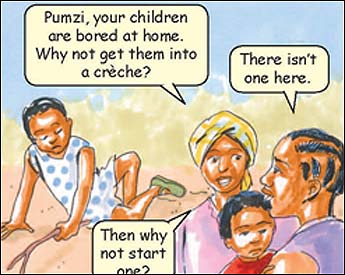
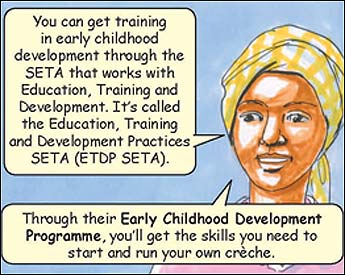
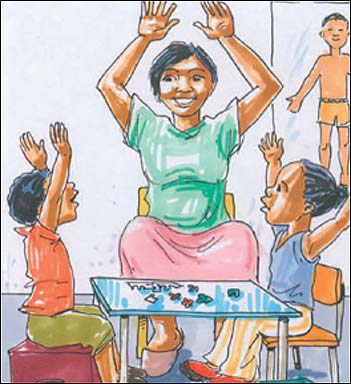 Children from birth to nine years old need special support to develop their bodies, minds and emotions in the the best possible way. Children who have attended a properly run crèche or preschool, have a great advantage over those who have not. Help your children. Help other people's children. Give them the great start in life that will help them develop their talents to the full.
Children from birth to nine years old need special support to develop their bodies, minds and emotions in the the best possible way. Children who have attended a properly run crèche or preschool, have a great advantage over those who have not. Help your children. Help other people's children. Give them the great start in life that will help them develop their talents to the full.
Department of Social Development
(012) 312 7666
Education, Training and D evelopment
Practices SETA (ETDP SETA )
0800 383 773 or (011) 628 5000
HOME COMMUNITY-BASED CARE (HCBC)
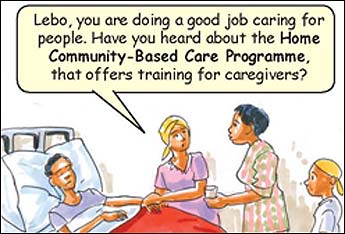
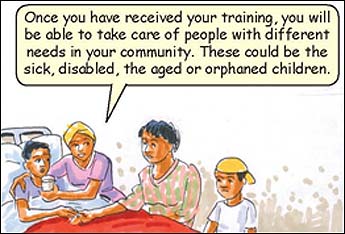
The Home Community-Based Care Programme helps formal and informal caregivers in communities to give health and social services to people who are in need.
Through the programme, trainees learn to:
identify families in need, like orphans, the disabled, and the chronically ill
link these vulnerable families with poverty-relief programmes and services
care for the physical needs of AIDS sufferers and other patients
counsel and comfort the distressed, sick or suffering
help with family planning, burials and getting grants, and other services.
This course is SETA-accredited. Successful trainees can start a facility, apply for a Home Community-Based Care grant to run the facility, and train others to work as Home Community-Based Caregivers.
The following groups of people qualify for receiving help on this programme:
HIV-positive people who do not receive a state grant
Adult dependents of a person who is terminally ill
Unemployed people from a household with an income of less than R1 500 per month
Contact: (012) 312 7666/1

Some of us who received training on these programmes have started our own businesses. We used the opportunity not only to gain employment, but to learn skills for the future!
This panel first appeared in Building a People's Contract for Growth and Development, a booklet published by Government.
For more information, contact the Batho Pele Call Centre at 1020
CELEBRATE BUT WATCH YOUR SPENDING
CELEBRATE BUT WATCH YOUR SPENDING sadminFESTIVE FOCUS
CELEBRATE BUT WATCH YOUR SPENDING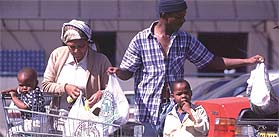
Happy days are here again. It's holidays and a time when many people will spend money they saved during the year. It's good to buy gifts for loved ones and to celebrate, but people should be careful not to overspend.
Spending becomes a problem when children cannot go back to school because parents used all the money for new clothes, gifts and parties or get into debt. Sometimes no money is left for parents' transport to work in the city and to be back home in time.
Because this is also a time for temptations, Vuk'uzenzele talked to the South African Savings Institute about overspending. Their motto is 'Make every month savings month.' Their advice to Vuk'uzenzele  readers is to think ahead and save, save, save!
readers is to think ahead and save, save, save!
Make every month savings month
Change the way you think; don't be comfortable with debt. Make a promise to yourself to be debt free within three, six or 12 months.
Pay off debt as soon as you can, but do not borrow money to pay off debt.
Avoid opening clothing accounts, it causes unnecessary spending.
Draw up a budget, check the budget monthly and watch your spending carefully.
January is school expense month; keep money aside from annual bonus or monthly savings for things like school uniforms and books.
Make a note of everything you buy. This will show up unnecessary spending.
You don't have to be like those people who buy too much. Everybody's needs are different.
Shop around before you buy. Compare prices.
Remember, it is never too early to start saving for retirement.
Get a money box and save money that you would have spent on lottery, cigarettes etc.
Teach your children to save from an early age.
Start a savings club with some friends, family or colleagues.
- Ndivhuwo Khangale
Tips for saving this festive season:
- Set aside between 15 and 20 per cent of your bonus or savings for a longer term goal like retirement, education or housing.
- Expensive gifts are often unnecessary. Rather find out what someone really needs and buy a less expensive, useful gift.
- Think of three expensive things that you can cut down immediately and use the money for something useful.
- If you are a member of a stokvel:
- Encourage members of your group to put aside some of the money they would use for year-end-parties for something like paying school fees up front.
- If the money is being used for groceries, buy together in bulk and share the goods rather than splitting the money first.
For more information, call 1020, or contact the South African Savings Institute at (011) 269 3683
CONTRACTS - DON'T JUST SIGN
CONTRACTS - DON'T JUST SIGN sadminUNDERSTANDING THE LAW
CONTRACTS: DON'T JUST SIGN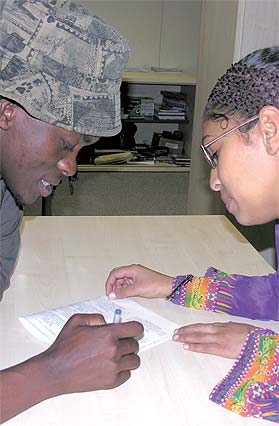
Like many youngsters in townships playing soccer, Sipho Ndzuzo’s dream was to see himself wearing a professional team jersey. After passing matric in 1994, Ndzuzo, then 21, could not believe it when one of the Premiership Soccer League teams asked him to play for them. Ndzuzo didn't care about the blank contract he had to sign; all he wanted was to become a professional player who would be famous and make money.
Wanted to move
That blank contract nearly destroyed Ndzuzo's life. He had to stay with the team for four years when he only wanted to be there for a year. When he wanted to move to other clubs, he was told that he had signed a four-year contract and couldn't go anywhere. 'It was my first contract and I didn't know what I signed for,' said Ndzuzo, who is now the general secretary of the South African Players' Union. Many people have found themselves in similar situations. They didn't understand what they were signing. This doesn't only happen in work situations, but also when buying on credit, getting a bank loan or other forms of credit.
Written contracts
A contract is an agreement between two parties. It can be an agreement to provide services or sell goods on credit in exchange for money that is paid over a specific period of time. Written contracts are there because verbal (spoken) agreements are difficult to prove when the two parties have different stories.
Before signing
A contract agreement should be in writing. Both the service giver and the receiver, for example a worker and an employer, must read and understand it before they sign it. Both should keep a copy of the contract. If for some reason you have to sign a second contract, do not think it is the same as the first one; treat it as a new contract. Before signing, make sure you understand what you are signing. If you are buying goods on credit, the contract agreement should say exactly what goods you are buying; for example, the model and the serial number of the machine. If it is a loan, the contract must give the amount of money you borrow, the interest rate, other charges like finance charges, monthly instalments and the period of repayment. If it is a job contract, the contract should state the kind of job, what is expected of you as a worker, the period of your employment and the salary.
Proof
When someone says that you have signed a contract and you know nothing about it, ask for proof that you have signed it. If necessary, get a lawyer to assist you.
- Ndivhuwo Khangale
A contract should be in writing. You must read and understand it before signing.
For more information on contracts, call 086 166 2837, or 1020
GOVERNMENT'S HIV AND AIDS PLAN UP AND RUNNING
GOVERNMENT'S HIV AND AIDS PLAN UP AND RUNNING sadminHIV/AIDS
HIV/AIDS PLAN IS UP AND RUNNING
South Africa's Aids plan has grown to be one of the broadest and largest in the world according to the World Health Organisation. But there is still much more to do.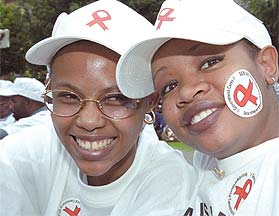
Broad plan
In 2001, government started its comprehensive plan to deal with HIV and Aids.
The comprehensive plan covers many different areas related to HIV and Aids. Through this plan a lot has been done to manage the disease and to treat and care for people living with HIV and Aids. To make the plan more effective Cabinet recently re-started the Inter-Ministerial Committee on HIV and Aids. The Committee, headed by Deputy President Phumzile Mlambo-Ngcuka, had its first meeting on 14 September.
It meets every month to ensure co-ordination in government's implementation of the programme and to give support to the South African National Aids Council (SANAC). SANAC's task is to unite every section of society in a national partnership to fight HIV and Aids. The HIV and Aids plan is also helping to strengthen the national health system.
South Africa has set aside billions of rands in its budget to give antiretroviral treatment.
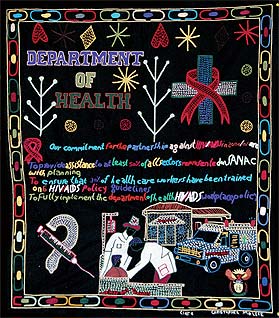
Service point stations
Government’s expenditure on HIV and Aids has increased from R30 million in 1994 to over R3 billion in 2005/6.
South Africa now has the largest antiretroviral treatment programme in the world and it is continuing to grow to reach more people in need.
As part of the HIV and Aids plan, there is at least one service point for HIV and Aids patients at 53 health districts in the country.
The service points assist with giving condoms and nutritional supplements, antiretroviral treatment and voluntary counselling and testing.
Prevention
South Africa's HIV and Aids plan focuses on preventing the disease so that people who are not infected stay HIV negative.
For our nation to succeed in preventing infection, everyone needs to be aware of the dangers of unsafe sex. Messages telling people how to avoid being infected or to avoid infecting others are helping to change behaviour.
Preventing infection passing from a mother to her child is also an important part of the programme. So is treatment of women who have been raped, to try to make sure they don't get infected.
Partners
Partners like LoveLife joined the government in the fight against sexually transmitted diseases.
Messages were sent out about things like prevention, support for orphans and how to live positively. The communication campaign helps to spread the ABC message - Abstinence, Be faithful and Condomise.
This has helped to change many people’s sexual behaviour.
Health care workers
Government is also improving working conditions in health care so that more professionals are added to the health system.
The improvements include extra money for people with scarce skills like doctors, pharmacists and specialist nurses.
Health professionals working in rural areas and in less developed parts of the country will also get extra money.
- Ndivhuwo Khangale
South Africa's HIV and Aids Plan focuses on preventing the disease so that people who are not infected stay HIV negative. It also gives treatment, care and support.
HIV and Aids is one of the biggest challenges facing the world today. There is still no cure for HIV and Aids, but with a proper plan and cooperation between government, non-government organisations and big business, the disease can be managed.
Did you know?
Health centres giving voluntary counselling and testing have increased from 3 369 in 2004/5 to 4 930 in 2005/6.
By the end of June 2006, over 178 635 patients had started antiretroviral treatment in the public sector.
In 2005/6, the number of condoms given out by government increased to 386 million condoms for men and 1,3 million for women.
More than 1 060 professional people in health care, like doctors, nurses and pharmacists have been appointed in health services. About 7 600 have been appointed in management and to care for, and treat, HIV and Aids patients.
For more information, call the AIDS Helpline: 0800 012 322
GOVERNMENTS POWERS IN ACTION - HOW OUR DEMOCRACY WORKS
GOVERNMENTS POWERS IN ACTION - HOW OUR DEMOCRACY WORKS sadminHOW OUR DEMOCRACY WORKS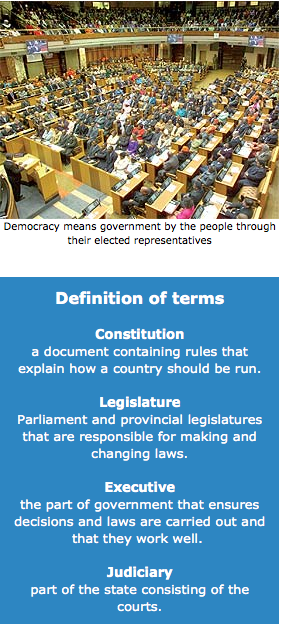
GOVERNMENT'S POWERS IN ACTION
South Africa is a constitutional democracy. This means the country is ruled in line with its Constitution by representatives elected by the people. The Constitution is the highest law of the land. All other laws and behaviour must be in keeping with the Constitution.
Three parts
The Constitution divides the powers of government into three parts:
- legislative powers (making and changing laws);
- executive powers (managing the day-to-day functions of government); and
- judicial powers (the system of justice and courts of law).
Each power (part) is carried out separately by one body of the state. The Constitution separates these powers to prevent giving more power to one body and to ensure each body gives attention to its tasks. The national and provincial lawmaking bodies make laws at the national and provincial levels. At the municipal level, the municipal councils make laws relating to municipal matters. The President has the executive powers of the country. In the provinces, the Premiers have the executive powers and in the municipalities, the councils have the executive powers. The courts have the judicial power of South Africa.
Independent courts
The President cannot take part in the decisions of the courts, because the courts are separate and independent from the Executive. This means the courts are only guided by the Constitution and the country's laws. No state body may interfere with the manner in which courts operate. Judges are appointed by the President with the help of the Judicial Service Commission. The Commission is made up of a number of judges.
Constitutional rights
If people or organisations believe that the courts, the President or Parliament, have not respected their constitutional rights, they can appeal against the findings. For example, a person can appeal against the outcome of a court case and it will be re-examined. If state bodies are accused of abusing their power, there are separate bodies that investigate the charges. These include the Public Protector, the Human Rights Commission, the Public Service Commission and the Constitutional Court. Court officers have to promise that they will be faithful to South Africa, support, respect and protect the Constitution, and run the administration of justice without fear, favour or discrimination.
- Justice Mohale
Contact Overstrand at 028-3138054 or call 1020 to find out more
GRANNIES TEACH TEENS ABOUT HIV AND AIDS
GRANNIES TEACH TEENS ABOUT HIV AND AIDS sadminHIV AND AIDS
TEENS TOUGHT ABOUT HIV/AIDS BY GRANNY ACTION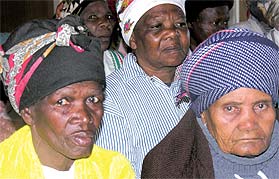
Nokhanya Booi is an elderly grandmother who does not know her age. But she is old enough to have surprised her teenage grandchildren when she started teaching them about sex related matters. They found it very strange that their 'makhulu' (grandmother in isiXhosa), would know about HIV and Aids and other sexually transmitted diseases, and the dangers of unprotected sex.
Things have changed
Booi lives in Kubusie Village in the Eastern Cape. Here, elderly grandmothers often drink traditional beer with their friends to keep them busy. They mostly talk about cattle, rain, drought and ploughing the fields. But the grannies also talk about problems facing today's parents and the youth. They do this in a very careful way, because in the old days, the elders would not talk openly about family issues, sexual diseases and abuse - it was not acceptable. But it is clear that things have changed in Kubusie and surrounding villages in the Amathole District Municipality.
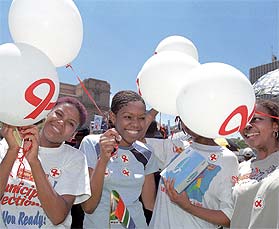
Talking openly
Now grandmothers as old as 80 years say issues of HIV and Aids, rape and abuse are not only for the leaders and those who can read and write. They have joined a project called Age-In-Action where they talk openly about their grandchildren’s sexual behaviour and the dangers of unsafe sex. It was the same project that helped Booi open up and talk about sex with her grandchildren without any difficulties. 'My daughter died of Aids,' Booi said. 'I am now looking after her three children. I tell them what killed their mother and that if they don't protect themselves, they too will die.'
Workshops
The Age-In-Action project was started by the Community Information, Empowerment and Transparency Trust in May this year. The trust is a non-government organisation that finds ways to close the gap between the elders and the youth in the fight against HIV and Aids and other problems affecting communities. The elders meet three times a week where they share experiences on how HIV and Aids affects their lives. They invite social workers, health workers and other organisations that deal with women and youth development in the villages to give workshops. Matters like HIV and Aids and how to use condoms and other contraceptives are discussed.
'Children having sex'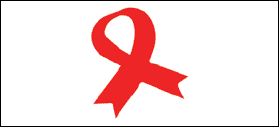
At a recent workshop, the elders received certificates. Grandmothers talked about how the project had changed their lives and the lives of the entire community. 'We have realised that our children are having sex and there's nothing we can do to stop them,' said Nomtazi Nogqala (66). 'All we can do is help them protect themselves.'
Avoid infection
She said she had little chance of being infected with HIV and Aids. But her grandchildren could die of Aids-related diseases and she could teach them how to avoid being infected.
First of its kind
Ncumisa Ngxowa of the Community Information, Empowerment and Transparency Trust in the Eastern Cape, said the project was the first of its kind. Grandparents are often the ones who have to raise their grandchildren. The project empowers them to talk to their grandchildren about these issues and to teach them how to protect themselves. The project was sponsored by the Conflict and Governance Facility, which is a partnership between government and the European Union.
- Ndivhuwo Khangale
For more information on Age-In-Action projects in the Amathole District, contact:
(043) 722-0655, or
083 597 1631
For more information on HIV and Aids, call the Aids Helpline on
0800 012 322
HAVE FUN...BUT OBEY THE RULES OF THE ROAD
HAVE FUN...BUT OBEY THE RULES OF THE ROAD sadmin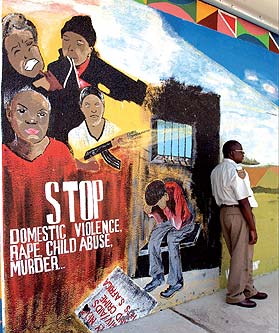
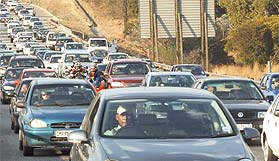
FESTIVE FOCUS
HAVE FUN...BUT OBEY THE RULES OF THE ROAD
The festive season is a time for fun and celebration. But it is also a time when there are many more vehicles and more accidents on our roads.
Road accidents affect all of us. It is a serious problem that costs the government about R43 billion a year. Minister of Transport, Jeff Radebe, said road accidents slow down economic growth. This means fewer jobs can be created.
Economic growth
Radebe said South Africas economy was growing well and drivers could help to ensure that it grows even faster if they obeyed the rules of the road. He encouraged traffic officers to punish drivers who broke the rules, because they put other people's lives at risk.
Road accidents happen mostly due to drivers ignoring the rules of the road, speeding, driving while drunk, skipping red robots and overtaking other vehicles when it is not safe to do so. This causes the death or injury of drivers, passengers and pedestrians.
People die in accidents
Radebe said it was found that about 7 000 people who were involved in road accidents became permanently disabled every year. Last year alone, more than 12 000 people died in roads accidents.
'We are working very hard to ensure that there will be less road accidents during the 2006 holidays,' he said. As part of the road safety plan, there will be 1 000 roadblocks every day all over the country until after the December holidays. 'There will be more traffic officers to ensure that drivers who do not respect the rules of the road are caught and fined,' he said.
Video cameras will be placed inside some of the cars used by traffic officers to help them see which drivers break the rules. Radebe said the Department of Transport would be working together with other departments, schools and communities to highlight the importance of people being visible on the roads.
Safe environment
The government’s road safety plan is aimed at cutting the number of road deaths by half by 2014. 'The plan to reduce deaths on our roads starts now to ensure that the 2010 Soccer World Cup will be played in a safe environment,' Radebe said.
- Justice Mohale
RULES FOR DRIVERS
- Keep to the speed limit
- Don't drink and drive
- Don't skip red robots
- Always obey traffic signs
- Always wear a seat belt
- Rest after long distances
- Don't overtake recklessly
- Your car must be roadworthy
- You must have a valid driver's licence
For more information,
call 1020
HOW THE OMBUDSMAN CAN HELP YOU
HOW THE OMBUDSMAN CAN HELP YOU sadmin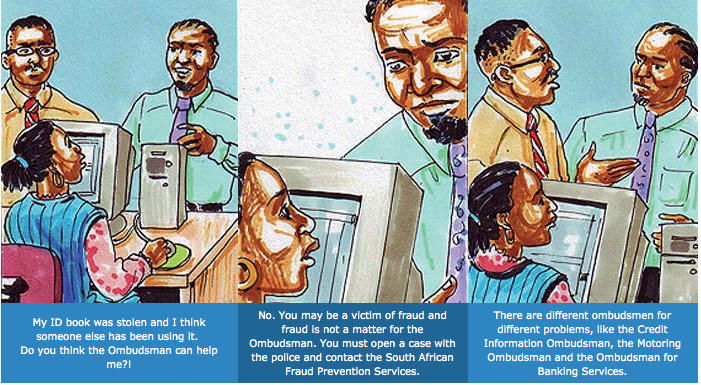
Ombudsman - a person who represents consumers.
The Credit Information Ombudsman is there to help people who are unhappy with the way the Credit Bureau handled their problems. When people call about problems that have nothing to do with credit, the ombudsman will not be able to help. There are different ombudsmen and bodies that deal with specific problems.
The Credit Ombudsman can only help you:
- when there is wrong information on account payments - for example, if you know nothing about the debt you are blacklisted for.
- if old credit information still appears on your credit report for longer than the normal period.
- when the shop or company (credit giver) that sent your information to the credit bureau did not give the correct information.
- when the shops did not let you know that you would be blacklisted.
- when you did not pay your account because you lost your job.
- when you have been blacklisted for the same thing twice.
- when you were blacklisted after you were a victim of fraud.
Where to go for other matters
- Theft and fraud: For example if you suspect your ID has been stolen and that a fraud has been committed, you can contact the police and open a case. Then call the South African Fraud Prevention Services at (011) 869-6460.
- Debt recovery and repossession: For example if someone wants to collect your goods without your knowledge or collect more money than you owe, you can contact the Council for Debt Collectors on (012) 804-9808.
- Employment: For example if you apply for a job and the employer gets your credit report without your permission, while the position has nothing to do with money or credit, you can contact the Association of Personnel Service Organisations on (011) 615-9422.
- Banking: For example if you have any complaints with the bank, their services, products, the way you have been treated, or loss of money through the bank's fault, contact the Ombudsman for Banking Services on 0860 800 900.
- Motoring: For problems relating to cars, contact the Motoring Ombudsman on (012) 361-8824.
- Insurance or Policy complaints: Contact the Insurance or Policy Ombudsman on (011) 726-8900 or (021) 657-5000.
- Consumer issues: Contact the Provincial Consumer Affairs offices (check local telephone directory for your province).
- Ndivhuwo Khangale
You can call the Ombudsman: 086 166 2837
IMBIZO FEEDBACK - INTEGRATED DEVELOPMENT PLANS
IMBIZO FEEDBACK - INTEGRATED DEVELOPMENT PLANS sadminIMBIZO FEEDBACK
INTEGRATED DEVELOPMENT PLANS - HELPING TO REACH DELIVERY GOALS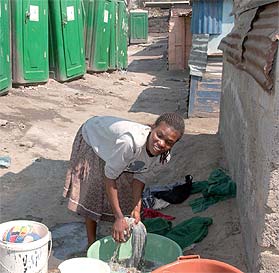
Poor service delivery is a major problem for many communities. It is among the issues most often raised during National Imbizo Weeks. Leaders from all levels of government visit communities countrywide during izimbizo. One aim is to find out what progress has been made with service delivery. It also aims to put plans into place to speed up delivery. This is part of government's programme to make sure our lives are better.
Economic development
The last Imbizo Week was held from 26 to 31 October this year. During this time, special focus was placed on local economic development. A strong economy will help our local governments improve service delivery. For this reason, municipalities adopted five-year development plans after the local elections. As part of the five-year plans, every municipality must have an Integrated Development Plan. 'Integrated planning' means that all processes work together for future development. Integrated Development Plans will help municipalities to reach the goals that have been set for service delivery, like getting rid of the bucket system by 2007.
Poor planning
Development plans are necessary because apartheid left behind towns and cities that were poorly planned.
In these towns:
business and residential areas were separated by race;
there were big differences in the level of services between the rich and poor areas;
rural areas were left underdeveloped with almost no services;
poor people lived far from the town centre and had to travel long distances to work.
Overall framework
With integrated development planning the entire municipality and its people work together to find the best solutions to the poor planning of the past. Public participation takes place through community meetings, discussions, forums and opinion surveys. An Integrated Development Plan is an overall framework for an area's development. It brings together the work of local government and other levels of government to improve the quality of life of all people living in the area. The plan looks at conditions and problems in the area. It looks at what is already available in the area and finds out what is most needed to speed up development.
- Louise van Niekerk
We need Integrated Development Plans because:
- they help speed up delivery;
- they help local municipalities to focus on the most important needs of their people;
- government departments and private companies will be more willing to put money into municipalities that have clear development plans;
- the whole community takes part and decisions are made in a democratic way;
- they help to overcome the problems left by apartheid;
- the different levels of government work together to deal with problems.
KEEPING IT BRIEF
KEEPING IT BRIEF sadminKEEPING IT BRIEF
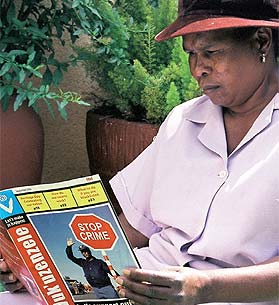
Share your copy of Vuk'uzenzele
Knowledge is power and Vuk'uzenzele is a source of knowledge. The magazine was started last year for people who had little or no access to information in the past. It tells poor and unemployed people about government’s programmes and opportunities that could improve their lives. We know that most of you would like to have your own copy of Vuk'uzenzele, but at this stage government can only print a limited number. It is part of our culture to share. Sharing what we have shows that our people have a spirit of 'botho' or 'ubuntu'. Because 'botho' , a Sesotho word for 'humane', exists among us, we ask our readers to share their copies of the magazine with each other after they have read it. If there is information that is important to you, you can write it down before passing the magazine on. Remember, by sharing the information we don't only show our spirit of 'ubuntu' , but help to empower each other.
- Staff Reporter
'Ubuntu' is a spirit among Africans that encourages working together as a group for the survival of the whole community. This is a result of surviving poverty through collective effort.
Mpumalanga
As part of efforts to fight hunger and poverty, the Mpumalanga provincial government handed over farming equipment worth more than R2 million to the Kadishi Cooperative. This community-based farming project in the Graskop area of the Thaba Chweu Municipality, is made up of about four farming communities. They received tractors, ploughs, planters, harvesters, seeds and fertilizers.
- BuaNews
Free State
A new trauma unit was opened in the Pelonomi Hospital in Bloemfontein in October. The unit is the biggest of its kind in the country and will give much-needed training to health professionals. Pelonomi is one of two hospitals on the renewal programme of the Free State's Health Department. It serves the Free State, as well as parts of the Northern Cape and Eastern Cape.
- BuaNews
North West
A R70-million health centre in Itsoseng township near Lichtenburg is being built. 14 staff houses, an Emergency Medical Services block, a mortuary and a guardhouse have nearly been completed. The project has created more than 100 jobs for local people who were previously unemployed.
- BuaNews
Northern Cape
Leading up to the 2010 Soccer World Cup, government is putting R395 million into developments at the Kgalagadi Transfrontier Park in the Northern Cape. Kgalagadi, previously known as the Kalahari Gemsbok National Park, celebrated its 75th anniversary in September. It was the first transfrontier park in Africa. A transfrontier park extends across South Africa's border into another country.
- BuaNews
Eastern Cape
The Development Bank of Southern Africa approved R54 million to build a salt crystallisation plant at the Coega Industrial Development Zone near Port Elizabeth. The zone is high on government’s list of projects to bring economic benefits to the Eastern Cape, create jobs, speed up industrial development and promote international trade. About 200 jobs will be created during the building phase, which is due to start in February 2007.
- BuaNews
KwaZulu-Natal
Needy students have received bursaries from the provincial department of Social Welfare and Population Development to complete their studies in social work. The bursaries are worth R16 000 each and are aimed at addressing the shortage of social workers in the department. On completion of their studies, the students will have to work for the department for an agreed period.
- BuaNews
For more information about the news items featured on this page, call 1020
Letters
Letters sadminLETTERS TO THE EDITOR
GIVE US A PIECE OF YOUR MIND
WINNING LETTER
Corruption is a cancer
As weeds overgrow gardens, so is South Africa being invaded by criminal elements that feel thoroughly at home in this country. One can hardly open a newspaper or watch the news on TV without coming across corruption at public level. Corruption is a cancer that can destroy our society and country if allowed to fester. Good governance, democracy, development, law and stability are all impossible in a country consumed by corruption. In the past, we fought against the major evils of oppression, racism and injustice and we won. We should now insist on high standards of integrity and honesty among people in public service or office. Our country is beautiful and promising; we can make it even more prosperous by arresting the escalating levels of corruption.
- Simon Mphulenyane, Botshabelo, Free State
Winner of the Motorola C680 cellphone sponsored by:
LEWIS
Recognise ex-prisoners
Government is spending billions of rands to educate, train and rehabilitate offenders. But the very same government suppresses, ignores and discriminates against ex-offenders - there are no jobs for ex-prisoners in both government or the private sector. Many ex-offenders are educated and rehabilitated; some of them have degrees and other tertiary qualifications! The Minister in the Department of Correctional Services set a good example by employing ex-offenders in his office. Let's support the Minister's aims and plans to build a peaceful and crime-free society. There must be restorative justice, reconciliation and accommodation for ex-prisoners in South Africa.
- Augustine Molai, Pretoria
Drugs make you stupid
Drugs and the youth is a major problem in South Africa. Why do teenagers persist in taking drugs, when they know the consequences? Are they just plain stupid? School kids sometimes take drugs on the school premises during classes. Even grade 5 children are becoming addicted. You can’t study while you are high on drugs. You’ll fail and without education all you will have left is a life of crime and addiction. Drugs make you stupid so you have unsafe sex that leads to HIV and Aids. Drugs will turn you into a slave and you will be unable to do anything with your life except drugs. Is that what you want? The choice is yours!
- Zokwana Papikie, Koringpunt, Limpopo
Give us high employment
After ten years of democracy, the rate of unemployment is still rising. Victims of unemployment are mostly youth who are graduates and matriculants. Our government must do something to stop this disaster before it goes further. Let us have a high rate of employment, not unemployment!
- Harmans Pholo, Allanridge, Free State
Reply from the Department of Labour:
The latest figures given by Statistics South Africa shows that unemployment has dropped from 26,5 per cent in March 2005, to 25,6 per cent in March 2006. A total of 1,2 million jobs have been created over a period of five years. The 25,6 per cent unemployment rate recorded in March this year is the lowest since 2001. But there is still a challenge to employ more women. About 62,4 per cent of people who are unemployed are women. To help young people, learnership programmes are being put into place by various Sector Education and Training Authorities (SETAs) so that students can start working as soon as they finish their studies.
Show people how to do it for themselves
Unemployment is a problem that faces uneducated people, as well as university graduates, people living in rural areas and those in big cities. It's very unfortunate that some people resort to dangerous, unhealthy, risky and unacceptable ways of earning money, such as crime and prostitution. Government can't offer jobs to everyone. So let us all go beyond just telling people to get up and do it for themselves; we must actually show them and if necessary help them to do it. In this way, we will help government to reduce the levels of unemployment.
- Fanie Jacobson, Cornelia, Eastern Free State
Editor’s reply:
We hope you feel Vuk'uzenzele is helping to do this.
Proudly South African
The 'Proudly South African' campaign is one of the best campaigns that have emerged from this country since our democracy began. Let us start appreciating African made goods and do away with those products that are imported from overseas.
- Isaac Mtila, Disaneng, North West
Roads will be safe only if we work together
I want to convey a very strong message to our traffic officers not to tolerate drinking and driving, especially after all the horrible accidents we have seen in the past few months. I urge traffic officers, drivers, passengers and pedestrians - please work together to see that road safety is applied on the roads.
- Eric Ngxabani, Ezibeleni, Eastern Cape.
We must learn to be more dependent on ourselves
I would like to make a sincere call to my fellow citizens, especially we from the previously disadvantaged communities, to shed off a tendency of being 'poor and disadvantaged'. I know very well that the above phrase gives us an advantage when we ask for donations and handouts. We can't go on surviving from handouts from other nations. We must not fold our arms and watch our children drown in the pool of lawlessness and moral decay. Think about positive things that can empower you economically.
- Joseph Sello Dikobe, Jericho, North West
Knowledge is precious
People often complain because they are not well informed. The media, non-government organisations, ward councillors, chiefs and the church should all help government to reach people in need of social grants, bursaries, houses, water, electricity and other basic social needs. Knowledge is precious, information is helpful. Ask others and get help.
- Eric T. Chauke, Shirley Village, Limpopo
Stop smoking
Thank you for the article in Vuk'uzenzele giving the facts about smoking. It was an eye-opener for me and has changed my life completely. My advice to those who haven’t quit smoking is that it’s never too late. If I can do it, you can do it. Keep on trying, you will make it.
- Thomo Nkgadima, Pretoria
All letters on these pages that require a response from government, will be handed over to the relevant department.
We receive hundreds of letters and e-mails from you. Everyone will get a response. Remember to include your name and address.
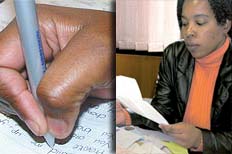
MERSETA - WORK HARD AND THE OPPORTUNITIES WILL COME
MERSETA - WORK HARD AND THE OPPORTUNITIES WILL COME sadminLEADERSHIP PROGRAMME
MERSETA - 'WORK HARD AND THE OPPORTUNITIES WILL COME'
Government's learnership programme has started to show positive results. Many young people are now receiving training from different companies. The learnership programme is part of government's wider 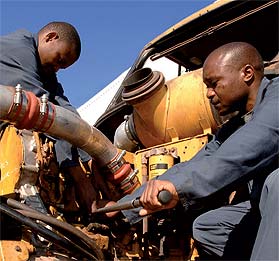 plan to develop skills among young and unemployed people. The Mechanical Engineering and Related Sector Education Training Authority (MERSETA) is one of the sectors that makes sure skills development takes place. MERSETA is one of the 23 Sector Education Training Authorities (SETAs) started under the Skills Development Law.
plan to develop skills among young and unemployed people. The Mechanical Engineering and Related Sector Education Training Authority (MERSETA) is one of the sectors that makes sure skills development takes place. MERSETA is one of the 23 Sector Education Training Authorities (SETAs) started under the Skills Development Law.
MERSETA's role
MERSETA's role is to speed up skills development in:
metal production and engineering;
manufacturing related to cars;
new tyre manufacturing; and
plastic industries.
Practical experience
Frans Mamabolo is one of hundreds of young people who benefited from MERSETA. He studied Electrical Engineering at Kempton Park Technical College in Gauteng. After Mambolo completed his studies he could not find a job. He applied for Barloworld Equipment's learnership programme, and was successful. He fixed caterpillars and road works machines. 'Since I joined Barloworld in 2004 my life has changed. I have gained more practical experience,' he said. Mamabolo, 28, wants to gain more experience to be able to start his own business. His advice to young people is: "Be patient, work hard and the opportunities will come."
Young people
Another person who benefited from the Learnership Programme was Thato Moletsane, 25. He also applied to train as a learner at Barloworld. Moletsane's application was successful and in 2004 he was employed as a fulltime staff member. Before joining Barloworld, Moletsane studied Engineering at Talatso FET College in Mafikeng, North West. "Learnerships play an important role in improving the lives of young people. Young people should stop sitting around doing nothing. They should go out to get information and use opportunities that exist," he said.
Who qualifies
Anyone who is interested in training in a certain career (employed or not) qualifies for a learnership. Learners must meet the requirements set by different programmes. Do NOT apply for learnerships to MERSETA. Go to your nearest Department of Labour and fill in the Job Seekers forms. Attach your Curriculum Vitae (CV); The department will place your names in its database. MERSETA will take the names from the department and forward them to companies that need learners. MERSETA will pay the companies' costs of training.
- Justice Mohale
Achievements
- MERSETA gave bursaries to 151 students.
- 53 students are doing in-service training for their National Diplomas in Engineering fields.
- 3 825 students on learnerships have graduated.
- 1 456 people passed ABET level 1.
National Tooling Initiative
As part of a National Tooling Initiative, ten learners funded by MERSETA spent 12 months training in toolmaking.
For more information, call 1020
NEW SKILLS FOR FORMER FREEDOM FIGHTERS
NEW SKILLS FOR FORMER FREEDOM FIGHTERS sadminNEW SKILLS FOR FORMER FREEDOM FIGHTERS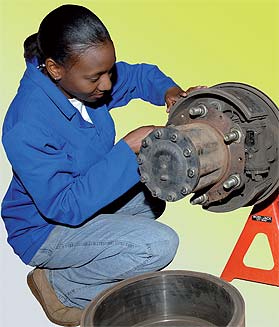
The shortage of skills is a serious problem in South Africa. It affects every sector of our society and adds to the high unemployment and poverty rate. To solve this problem, government set aside millions towards training unemployed people. Training programmes help ordinary people to get skills that empower them to find jobs or start businesses. Among those that will benefit from the skills development programmes are former members of the liberation struggle across political lines.
Training programmes
These include former members of Umkhonto we Sizwe, Azanian People's Liberation Army Self Defence Units, self protection units, commandos, community constables and members of the previous government's police force. Chairman of the Umkhonto we Sizwe Veterans Association (MKVA), Emmanuel Maphatsoe, told Vuk'uzenzele there were about 15 000 former members of these units countrywide.
The Ekurhuleni Metropolitan Council started a project to put such former members in different training programmes. Some private companies have shown interest in training and later employing them in agriculture, information technology, construction, electrical work, engineering and at call centres. Former members of the units are trained by the Safety and Security Sector Education and Training Authority (SSSETA), Maphatsoe said.
Importance of skills
'Training will ensure that they realise how important it is to have other skills than using guns,' he said. The MKVA arranges meetings with trainees to ensure that they are not involved in criminal activities. The MKVA joined forces with some construction companies so that they could share their knowledge in building and management. 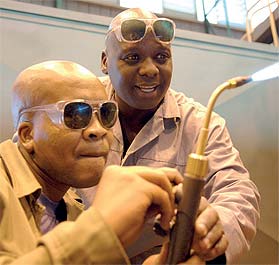
Maphatsoe said the MKVA also has an agreement with some farmers to use parts of their land for agricultural activities. Government has given the SSSETA R56 million to continue training former MK members.
Empowerment
The project leader in Ekurhuleni Metropolitan Council, Ugeshni Naidoo, said the programme helps former members of the units to become useful members of the community. 'The Council will help speed up their training because it is real community empowerment,' she said. A private company has already started identifying job opportunities for them.
'The project is a social contract where government, former members of the units and business work together to improve the lives of unskilled members in our society,' Naidoo said. This year, the MKVA also registered a trust to help the children and widows of some members who died. The funds raised will be used to pay for school fees, uniforms and food.
- Justice Mohale
For more information contact the MKVA at:
(011) 376-8700 or 083 584 0238
NO VIOLENCE AGAINST WOMEN AND CHILDREN
NO VIOLENCE AGAINST WOMEN AND CHILDREN sadminFESTIVE FOCUS
NO VIOLENCE AGAINST WOMEN AND CHILDREN
For most people the festive season is when they have good times with their families and friends. But this is also a time when alcohol and drug abuse increase.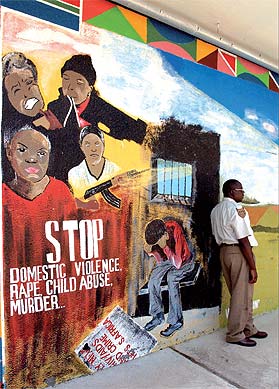
While many people will be dancing and singing 'Happy New Year!', some will be burying their loved ones due to death caused by abuse. Some, mostly women and children, will also suffer at the hands of husbands and fathers who will rape, beat and direct all sorts of abuse at them.
16 Days of Activism
During this time, we also hear of people being killed and killing themselves after drinking too much alcohol or overdosing on drugs.
To make everyone more aware of women and children abuse, and the abuse of drugs and alcohol, government has started the '16 Days of Activism for No Violence Against Women and Children.
Show support
The programme runs every year from 25 November (the International Day of No Violence against Women) to 10 December (International Human Rights Day).
During this period, people are encouraged to show their support for the fight against abuse by wearing a white ribbon.
There will also be a postcard campaign where the public will give their support by signing and returning the special postcard. They will raise R2 per postcard returned. This money will benefit victims of abuse.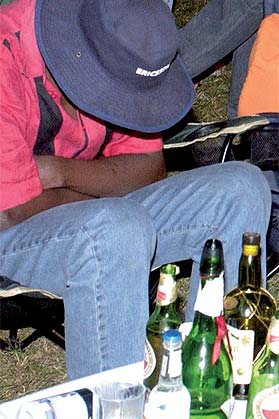
365 Days of action
To mark the 16th anniversary this year of the international project, it has been extended to a year-long programme. It is called '365 Days of Action to End Gender and Child Directed Violence.'
The programme is headed by the Deputy Minister of Provincial and Local Government, Nomatyala Hangana. She stressed that the new project was not replacing the 16 Days programme. 'It is meant to support and strengthen the fight against violence against women and children', she said.
Victims of abuse and violence must be assured that there is help. Hangana encouraged all victims to come forward for legal advice and the necessary support.
- Ndivhuwo Khangale
SUPPORT FOR WOMEN AND CHILDREN
National Crisis Helpline (Lifeline)
0861 322 322
People Opposed to Women Abuse
(011) 642-4345
Stop Gender Based Violence Helpline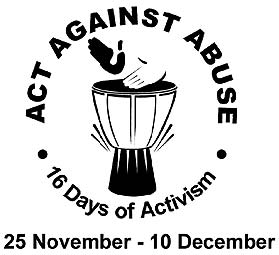
0800 150 150
Childline
0800 055 555
OTHER USEFUL CONTACTS
Family and Marriage Society of SA
(012) 460-0733
Alcoholics Anonymous
0861 435 722
South African National Council on Alcoholism and Drug Dependence (SANCA)
(011) 781-6410
For more information, call 1020
PROTECTING THE RIGHTS OF DOMESTIC WORKERS
PROTECTING THE RIGHTS OF DOMESTIC WORKERS sadminCONDITIONS OF EMPLOYMENT
PROTECTING THE RIGHTS OF DOMESTIC WORKERS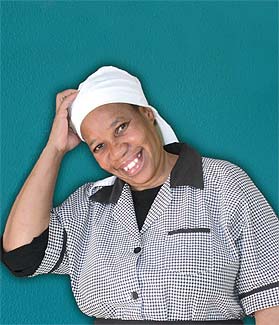
Domestic workers are a lot more protected in the new South Africa because there are laws that take care of their rights. The s e laws inc lude the Unemployment Insurance Act and the Basic Conditions of Employment Act: Domestic Workers Sector. The Unemployment Insurance Act says that if you are a domestic worker, you must be registered with the Department of Labour. This will let you claim money from the Unemployment Insurance Fund if you lose your job. Even if domestic workers do not want to be registered, their employers must register them. If your employer fails to register you, he or she could be fined up to R500 000.
Two per cent of pay
Employers of registered workers must pay two per cent of a worker’s pay per month to the Unemployment Insurance Fund. The employer can take one per cent from a worker's pay as the worker’s contribution and add another one per cent as the employer's contribution. This means the employer and the worker contribute one per cent each. The employer must send the money to the Unemployment Insurance Fund every month. Minister of Labour, Membathisi Mdladlana, said in 2003 the Unemployment Insurance Fund paid more than R65 million to about 74 000 domestic workers. This was after the law was extended to protect domestic workers. So far, the Fund registered more than 657 000 domestic employers and 500 000 domestic workers.
They deserve respect
Mdladlana said the law aims to bring back domestic workers' pride. Their rights are also human rights and they deserve to be treated with respect, he said. Most of the people in this sector are women. The majority of them work in kitchens and are often illtreated by their employers. The Basic Conditions of Employment Act: Domestic Workers Sector sets out the lowest possible wages, the number of hours domestic workers should work and the number of leave days they get. The law includes housekeepers, gardeners, nannies and domestic drivers. It states that the lowest monthly wage for domestic workers in the cities is R997,04 and R808,92 in rural areas.
- Justice Mohale
For more information,
contact the Department of
Labour at (012) 337-1680
RELATED SNIPPETS...
'uFiling' makes it easy
The Unemployment Insurance Fund started an electronic filing system called 'uFiling'. It is available on the Internet and makes it easier for small businesses and employers of domestic workers to obey the Unemployment Insurance Act. With 'uFiling' they can send information about their workers by e-mail to the Department of Labour. For more information on the 'uFiling' system, visit the website at: www.ufiling.gov.za
PUTTING OUR YOUTH FIRST
PUTTING OUR YOUTH FIRST sadminPUTTING OUR YOUTH FIRST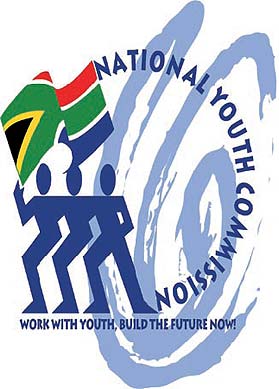
Youth Information Service
One of the most important programmes of the National Youth Commission is the Youth Information Service. Through this programme, the Youth Commission gives information to South Africa's youth on different issues that can improve their development. This includes information on careers and bursaries, safety and the law, democracy, health, how to get an ID, finding a job and starting your own business. The Youth Information Service was started in Port Elizabeth on 15 June 1998. The Information Service has four different tools through which young people can get information.
They are:
- the Youth Information Guide;
- the toll-free Youthline: 0800 000 001;
- the website: yis.gov.za; and
- the short message service (SMS): 34555
Youthline
The Youthline has become so popular that the Youth Commission is upgrading it to handle more calls. They will also give some of the youth counsellors further training to ensure that they can continue to give quality service to callers.
Youth Information Guide
The Youth Information Guide is one of the Youth Information Service's most successful projects.
For more information, or to get your FREE copy of the Youth Information Guide, call the Youtline on 0800 000 001, or write to the Call Manager, National Youth Commission, Private Bag X938, Pretoria 0001
ROLE MODELS
ROLE MODELS sadminROLE MODEL
STREET SELLERS IN FOCUS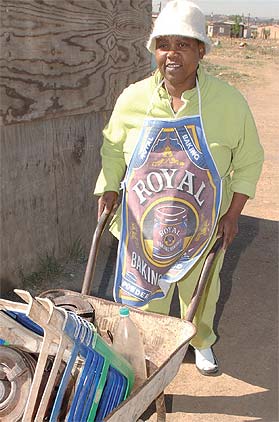
Patience pays off
Selling cups of tea, "vetkoek" (mag w i n y a ) and loose sweets requires patience. If street sellers are not patient they will not be able to make money and support their families or send their children to university or college, says Leah Mahlangu. Mahlangu's two children Joseph and Mduduzi are studying at the higher education level with the money she makes from selling sweets, magwinya and cups of tea. Her son Joseph got a Diploma in Marketing and is studying for a B-Tech degree in Marketing at Tshwane University of Technology. Joseph's younger brother, Mduduzi, is studying for a Diploma in Tourism at Damelin College. Mahlangu started selling at the local taxi rank in Nellmapius township in 1999 after she lost her job. She makes between R300 and R400 a day. She wakes up at 3:30 every morning to prepare the goods she will be selling. 'It's really difficult to be a breadwinner', she says. 'I leave home at 4:30 in the morning and push the full trolley with goods to the taxi rank. I work the whole day, even if it's raining heavily.' 'But my hard work has paid off, because my children are getting education at a high level,' she said.
Flowers colour his world
After he lost his job as a clerk, Sommas Nadasen of Laudium started selling flowers, silver vases, wheat and wreaths. He said it was painful to lose his job after working for the company for 20 years. But Nadasen couldn’t afford to feel sorry for himself. Selling in the streets was the only way to survive and pay for his children's education. He said it was difficult to support the whole family because his two school-going children had no bursaries. One of his children will finish his law degree at the end of the year and one is finishing matric. With the money he makes from selling in the street, he also pays rent, buys food and pays accounts for the whole family. 'As the breadwinner, I also give my children money for transport and pocket money when they go to school,' he said. Nadasen wakes up every morning at 4 o'clock to prepare for the day's selling.
'I make an honest living'
Musa Nkosi, 25, is a breadwinner who sells fruit on Church Square in Tshwane. He was born at Mkhuhlu village in Mpumalanga. Before he could finish his matric, he travelled to Tshwane to search for a job because he had to support his mother and two sisters. Nkosi started selling fruit and snacks after surviving from piece jobs for five years. 'It's better to sell fruit in the street and make an honest living than robbing people,' he said. He makes between R400 and R500 every day. His expenses include paying for the room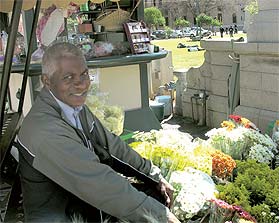 he rents, food, transport to take his goods to town and sending his mother between R1 500 and R2 000 a month for food. 'I opened a bank account and I want to use some of the money to complete my matric', Nkosi said. He plans to continue studying at university level in Business Management.
he rents, food, transport to take his goods to town and sending his mother between R1 500 and R2 000 a month for food. 'I opened a bank account and I want to use some of the money to complete my matric', Nkosi said. He plans to continue studying at university level in Business Management.
- Justice Mohale
ROOTING OUT CRIME TOGETHER
ROOTING OUT CRIME TOGETHER sadminSAFETY AND SECURITY
ROOTING OUT CRIME TOGETHER
There are signs that certain types of crime are decreasing. In the last five years crimes like assault and rape have dropped. But, during the same period, other serious crimes have increased. Minister of 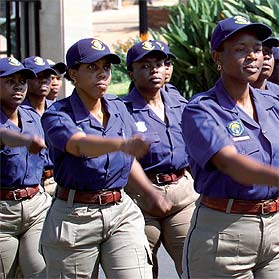 Safety and Security, Charles Nqakula, has given the assurance that, in the end, police will win the battle against criminals. 'We are working hard to prevent serious crimes from taking place and have arrested the most dangerous criminals, who are wanted by the police,' he said when he released the yearly police crime report last month.
Safety and Security, Charles Nqakula, has given the assurance that, in the end, police will win the battle against criminals. 'We are working hard to prevent serious crimes from taking place and have arrested the most dangerous criminals, who are wanted by the police,' he said when he released the yearly police crime report last month.
More police
Government is putting in more resources in the crime fight. The number of police will be increased and members of the police are encouraged to stay in their jobs. Police will also be trained to deal with all kinds of crime using modern, new equipment. Between June and July the police recovered 5 956 illegal guns and arrested 15 leaders of organised criminal groups. Police Commissioner Jackie Selebi said lists of the most wanted crime suspects have been sent to all provinces. He said 234 suspects would be charged in 216 cases of serious and violent crime. Selebi said 150 criminals who were arrested several times were linked to 471 criminal cases.
Alcohol and abuse
Nqakula said the abuse of women and children in homes was still a serious problem. Alcohol and drugs contribute a lot towards the high level of violence and abuse of women and children in homes. Nqakula said government's 16 Days of Activism for No Violence Against Women and Children campaign encouraged abused people to report to the police. He said this year the campaign would focus on people on farms and in rural areas, informal settlements and townships.
Assault at home
Assault often takes place in homes and between people who know each other. It's therefore difficult for the police to prevent such crimes because it happens behind closed doors, Nqakula said.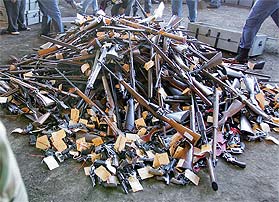 'Sometimes people who are abused fail to report to the police or cancel the cases they have made.' He said organised crime and cross-border crimes remained a serious problem that needed to be solved quickly. The government and business are looking at ways of stopping crime together.
'Sometimes people who are abused fail to report to the police or cancel the cases they have made.' He said organised crime and cross-border crimes remained a serious problem that needed to be solved quickly. The government and business are looking at ways of stopping crime together.
- Justice Mohale
To report crime or criminal activity, call Crime Stop on 08600 10111
SOCCER WORLD CUP - BECOME A 2010 AMBASSADOR
SOCCER WORLD CUP - BECOME A 2010 AMBASSADOR sadminSOCCER WORLD CUP
BECOME A 2010 AMBASSADOR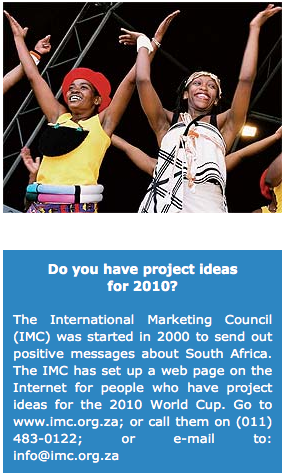
2010 fever is in the air and it is time to ask what we all can do to promote the World Cup in our country. Hosting the World Cup goes beyond building stadiums and having a strong national team. It calls for everyone to become a 2010 World Cup ambassador. These are people who will make sure that there is something happening in their communities in line with the World Cup. In South Africa, communities are brimming with activity. Cultural and modern dance groups, community policing forums and tribal councils are just some of the areas where people are getting themselves organised. Ambassadors must make sure tourists are welcomed and protected everywhere.
Get organised
We are still in the planning stage of the World Cup and this is the time to decide what impression we want to leave with the rest of the world. In South Africa, we have different cultures, writers, poets, artists and musicians. One does not need to be part of a multi-million project or be a well-known artist to become a 2010 ambassador. By organising an activity like a dance group on a street corner to entertain tourists, you will be showing the world a part of African culture.
Very successful
When Spain was planning to host the Olympic Games in Barcelona, there was a lot of bad publicity and many people didn't believe that the country was able to stage such a big event. But the games were very successful and there was a lot of positive news about Barcelona throughout the world. This was possible because everyone made a special effort to communicate positive messages. When Australia hosted the Olympic Games, its people also worked together as volunteers to show the world the positive side of their country. Everyone made a contribution, spreading the good news in one voice. Someone said after those games: "Even putting a smile on your face for the visitors was an act of being an ambassador."
Tourism increases
Countries that hosted events like the World Cup and the Olympics have all reported positive results for the country as a whole. In Australia, selling of goods overseas grew by 25 per cent, unemployment dropped and the economy grew by 7,9 per cent over two years. In Barcelona tourism has increased and in Germany business has grown. We will also succeed and be the ambassadors we know we can be.
- Ndivhuwo Khangale
STATE VISITS - STRENGTHENING INTERNATIONAL TIES
STATE VISITS - STRENGTHENING INTERNATIONAL TIES sadminSTATE VISITS
STRENGTHENING INTERNATIONAL TIES
The President, Deputy President, Ministers and Deputy Ministers do not go on state visits just to see other countries, said Deputy Minister of Foreign Affairs, Aziz Pahad. They go to strengthen our relations and economic cooperation with the rest of the world.
Development plans
Our leaders also discuss our development programmes. During a visit to Japan and Indonesia this year, the Deputy President, Phumzile Mlambo-Ngcuka, explained government's skills development efforts and Black Economic Empowerment, because these are not always well understood. She explained how AsgiSA, the Accelerated and Shared Growth Initiative for South Africa, will help us reach our goal of halving unemployment and poverty by 2014. The world’s leaders also talk about "hot" international matters, the Minister said. These include the situation in Africa, the Middle East, Iran and Iraq. State visits often include large international meetings called summits. Here, leaders from many countries get together to talk about matters that affect the whole world or a region. Examples are the African Union Summit for African leaders and the Afro-Asian Summit for leaders from Africa and Asia. Summits give our leaders a chance to tell other countries what South Africa can offer them.
Friendship agreement
South Africa also benefits when world leaders come to us on state visits. Russian President, for example, visited South Africa in September. He was the first Russian President to visit us. The visit led to Putin and President Thabo Mbeki signing an agreement of friendship and partnership which could lead to a huge amount of investment in our country.
- Louise van Niekerk
TEACH EVERY CHILD TO SWIM
TEACH EVERY CHILD TO SWIM sadminFESTIVE FOCUS
SAFETY IN THE WATER: TEACH EVERY CHILD TO SWIM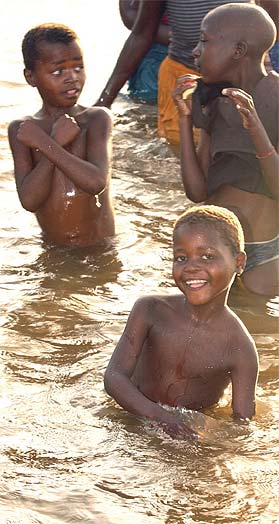
It's summertime and the holidays are here. Unlike many overseas countries where December is a time for snow, in South Africa it brings hot, sunny weather. The best way to cool off on a hot day is to swim or splash in cool water.
Rivers and dams
Many children will be visiting relatives in the rural areas and on farms where one of the most exciting things to do is swimming in rivers and dams. But this can be dangerous, because many children can't swim. Nearly 64 per cent of drownings in South Africa happens in rivers and dams. Drownings are the second highest cause of accidental deaths in the country. More than half of drownings involve children under the age of 15 years.
Swimming pools
Swimming South Africa is running the programme with the Department of Water Affairs and Forestry. Instructors teach children to swim and have fun in the water, but to be aware of the dangers, be it in dams, rivers or lakes. Swimming South Africa is also raising money to build swimming pools in rural areas. This will be done through municipalities. With this project they want to make sure all children have access to swimming pools.
- Ndivhuwo Khangale
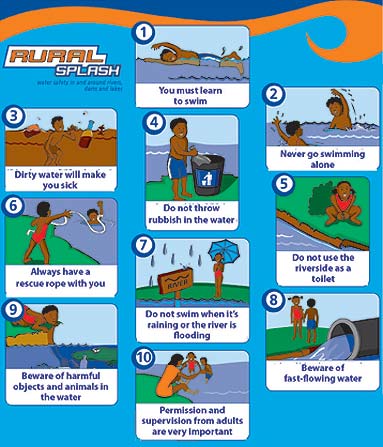
Safety Tips for Rivers and Dams
Safety Tips for Rivers and Dams
Before diving into the water, check how deep it is.
Teach children to swim and also teach them about the dangers of water.
If you live near water, make sure you know where small children are at all times.
Don't stand on hanging river banks or loose rocks near water.
Be sure you know where streams and water pools near your home are.
For more information on the Rural Splash programme,
call (011) 404-2480